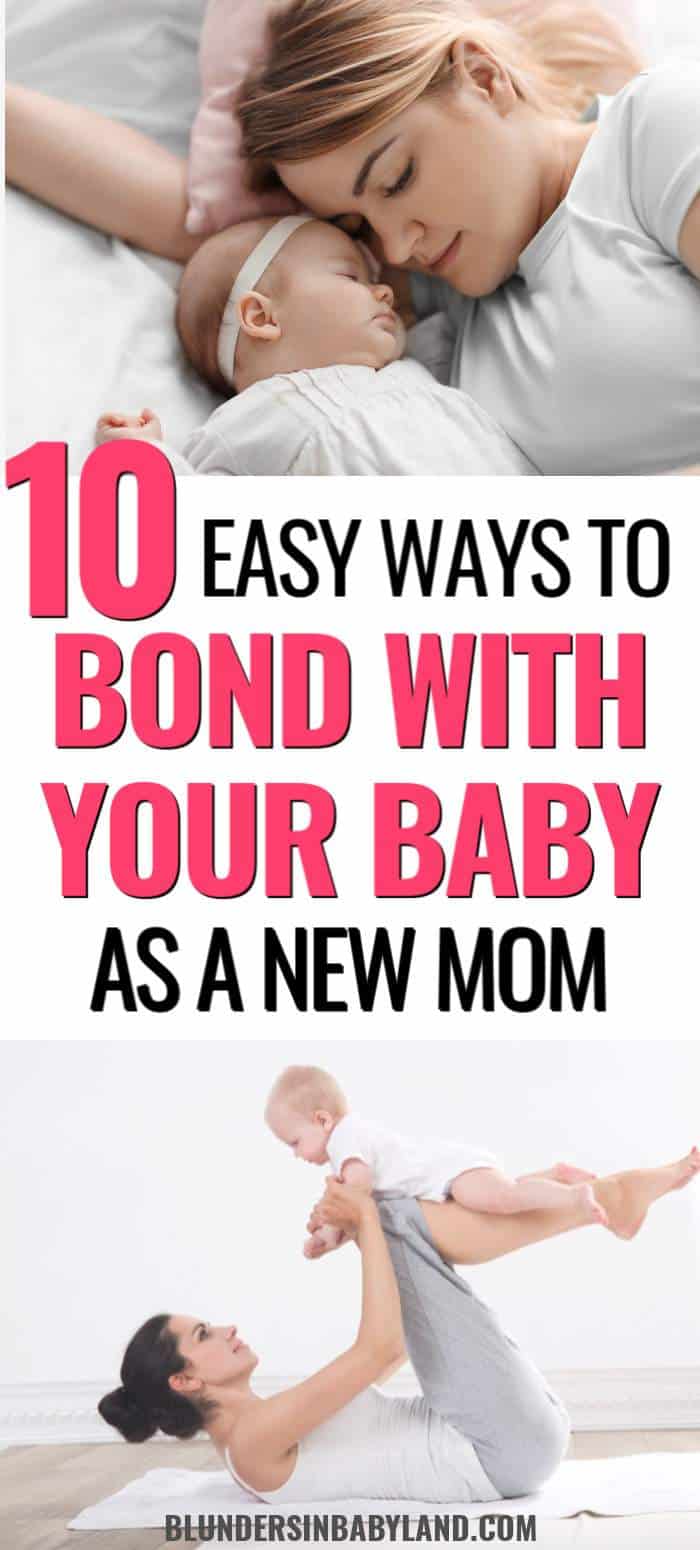How to Bond with Baby: 10 Easy Tips You’ll Both Love
You’ve dreamed about it a million times. After 9 long months, your baby bursts into the world. All of your fears, doubts, and worries about parenthood disappear and something just clicks. Bonding with your baby is as easy as breathing.
…except, it didn’t happen.
You know that you love your baby, but you just don’t feel it yet. You’re exhausted, emotionally drained, and scared spitless about the prospect of taking care of this little human. You’re not breastfeeding (the ultimate, coveted bonding experience). Maybe you’ve already gone back to work. Or, maybe you had a crappy relationship with your own mom and you feel like it’s impossible to bond with your baby.
You’re doing all the things and spending all the time, but you still feel oddly awkward and disconnected.
Whatever your situation is, let me just say: These feelings can be absolutely normal. Many, many women do not feel an instant bond with their child. So, before we even get started, let’s nix the guilt. This is normal. You’re normal.
From the moment my daughter was born, I knew I loved her. But after that, I struggled. She cried so much. Her feeding times interrupted my much-needed sleep. And, aside from instinct, I hadn’t developed an actual liking for her.
Not only that, but she seemed almost stand-offish, squirmy. I mean, wasn’t she supposed to love me?
All of these disappointments evolved into guilt. And that guilt further ruined our bonding process. I don’t want you to experience the same issues.
If you’re struggling, this post is all about how to bond with baby. We’re going to go over easy, daily exercises you can try as well as what’s going on psychologically, mentally, and physically, so you can understand the process a little better. Finally, we’ll talk about what you can do if you’re not bonding with baby and some warning signs you might want to look out for.
RELATED POSTS TO HOW TO BOND WITH BABY:
- How and When to Start Reading to Baby
- BabyCenter Meeting Milestones Through Play Class Review: Play Ideas that Improves Development
- 10 Easy Ways to Help Baby Sleep Through the Night
The Science of Bonding with Baby
Even if you don’t feel like it, you begin to bond with your baby the moment he’s born.
Perhaps you’ve already heard that skin-to-skin contact during the baby’s first hours of life is critical for bonding and medical reasons.
From your baby’s perspective, your skin actually has a calming affect. His breathing regulates, heart stabilizes, and his instinctive need to feed kicks in.
On your end, contact with your baby (especially when breastfeeding) releases oxytocin, the love hormone. You will also smell your baby, becoming acquainted with his unique scent and inhaling the pheromones his skin secretes. These pheromones also promote the bonding process.
If you’re reading this while you’re still pregnant, try to ensure that your baby receives an hour of uninterrupted skin-to-skin right after birth. If you’re past this milestone, don’t worry. Below, we’ll talk about critical ways you can bond with your baby right now.
How do I know if my baby has bonded with me?
A lot of moms feel like they don’t know how to bond with baby simply because their little one doesn’t act affectionate. If this is you, realize that babies attach differently than us.
They’re instinctive creatures; if they’re touched a way they don’t like, they’ll cry. If they are uncomfortable, they’ll wail. They aren’t like your partner (who might tell you politely that he doesn’t like his hand rubbed a certain way).
Also, some babies are automatically more independent than others. My daughter–straight out of the womb–was fiercely independent. Sometimes, she didn’t even seem to like being held.
Having said that, around 2-4 months, you’ll notice signs that your baby has bonded with you. At first, these signs are going to be very subtle. Then, more and more, you’ll feel confident about your baby’s feelings.
Signs of secure attachment in babies:
- Staring. There is no better compliment in the world! A comfortable baby will love staring at his caretaker’s face. Just keep in mind that many babies will actively avoid eye contact if they’re overstimulated.
- Cooing, laughing, or smiling at you
- Increased movement when you enter the room (excitement)
- Crying (especially when being put down)
- Sometimes baby cries more when you’re around (it’s really weird.) As his trust grows, your baby might feel that he can express his needs to you.
Not seeing any of these signs? Don’t worry. The tips below will help you learn how to bond with baby and help him feel a secure attachment to you.

How to Bond with Newborn: 10 Foolproof Tips
Practice Skin-to-Skin
Even if you’ve missed the “Golden Hour” at the hospital, skin-to-skin is still one of the best activities you can try to jumpstart bonding with a baby.
Also known as Kangaroo Care, it includes laying your baby on your chest with nothing but a diaper between you. Stay like this for up to an hour. You can practice skin-to-skin for up to 4 months to reap some of those critical benefits.
Many doctors believe that skin-to-skin can make the difference between life and death for preemies, not only for the babies, but for the mothers too. In fact, if you are suffering from the baby blues, skin-to-skin has been found to help reduce postpartum depression symptoms.
Make Feeding Time Cuddle Time
Not going to lie, when I breastfed, sometimes it was “Facebook time.” I think there is nothing wrong with taking a break while your baby is happily suckling away at your breast or bottle.
However, if you’re struggling bonding with baby, try to utilize feeding time the best you can. Get to know your baby’s features. Caress his or her hair. Concentrate on the feel of him against you.
Respond to Need Cries
I’m a big fan of getting babies on a flexible routine quickly. In fact, I have written several blog posts dedicated to this subject.
Having said that, I also believe that a schedule should never take precedence over your baby’s needs. Meaning, if your newborn is crying because she’s hungry, feed her!
Some moms believe that getting baby on a schedule means ignoring their hunger and watching the clock. Trust me, this is far from the point of a schedule.
This goes for other types of cries as well, such as cuddling, diaper changes, overstimulation, or overtired cries. If you respond to these cries with the appropriate solution, you’ll gain your baby’s trust and affection.
(If you’re reading this and wondering how the heck you can tell the difference between a hungry cry and an overtired cry, the Secrets of a Baby Whisperer helped me a ton!)
Sing, Talk, or Read
Bonding with baby is just as easy as speaking, singing, or reading to her.
Yes, sing, even if your voice sucks. My daughter still asks me to sing to her occasionally. It comforts her (Lord knows why…). Even if you miss a couple notes, your baby will naturally find your voice soothing and hypnotic.
If singing really isn’t your thing, just try reading. Newborns actually love being read to (seriously, at this age you could read a textbook to them and they’d be content). Over time, reading to your baby can be a very fun part of your return and even dramatically boost their cognitive development.
RELATED POST: 20 Best Baby Books to Read for the First Year
Do Things Together
Grab the baby carrier and get out of the house! Take a walk. Go grocery shopping. Just like going on dates, exploring the world together creates familiarity and a bond.
Activities at home can also increase your bonding. Bath time was always an extra special time for my second daughter and I. At first it was a little rough because she hated baths, but after she adjusted, it became a fun time where she was able to explore her senses and relax.
Baby Massage
Have you heard of a baby massage yet?
Your touch has a powerful soothing effect on your baby. A baby massage takes that concept one step further. Think of a baby massage as a relaxing, full-body massage (or just arms, legs, or neck). To massage your baby, you apply baby oil and gently knead his muscles for about 10 minutes. You can begin massaging your newborn when he’s a few weeks old and continue to about 3 months.
There are so many great benefits for your newborn:
- Increases circulation
- Regulates breathing
- Can calm a colicky baby
- Reduces stress
- Relieves constipation or gas
And, of course, it helps you and baby bond. 🙂
Did you know that there is a CLASS that teaches about the best toys and activities to help your baby develop important skills? I recently took the BabyCenter Meeting Milestones Through Play online class and I loved the fun ideas it taught! If you’d like to learn more, check it out here. You can also read my full review here!
Smell your baby
Okay, bear with me; I know this is SUPER weird.
Going back to what we talked about in the beginning of this post, when you’re bonding with baby, getting a good whiff of his scent allows your body to absorb his pheromones. This biological connection is powerful. Some studies show that women can identify their child just by scent within just 10 minutes. And when they smell their kid, it stimulates a rush of oxytocin (remember, the love hormone).
If you’re a pumping mom, this one reason why many lactation consultants recommend that you bring your baby’s blanket to stimulate a letdown.
Limit Your Screen Time During Baby’s Play Time
This tip on how to bond with baby follows the same line of thought as feeding time.
There’s nothing wrong with checking your messages or Facebook while your baby is happily exploring the world. But, if you’re struggling to bond, be real with yourself about how involved you are in play time.
Are you offering words of encouragement when he’s trying to roll over? Do you help him discover new toys? When he sends you silly faces, are you responding?
I’m not saying you need to be a helicopter mom or minimize the importance of independent playtime. Just keep in mind that babies love interaction. They develop socially, mentally, and physically through these interactions.
Not only that, but play time is an opportunity to make sweet memories!
Commit to Daily “You” Time
It seems counter-intuitive that focusing on your baby too much can actually hinder the bonding process, but it’s totally true. When you’re burned out, your emotional bank is drained. It’s more difficult to feel connected when you’re exhausted or harboring resentment.
One of the absolute best bonding experiences for me was taking a break from momming and doing something for myself for a while. That allowed me to refresh, feel like “me” again, and even have the ability to miss my baby.
(Note: this is another reason why I firmly believe in a flexible routine. The routine we followed. E.A.S.Y., allowed me to have a break JUST FOR ME, every day for multiple hours.)
Follow a Bedtime Routine
Speaking of a routine, creating a bedtime routine can be one of the most beneficial things you do for you and your baby. Not only will it dramatically improve your baby’s sleep habits, but it creates a fun bonding experience for you both.
Bedtime routines don’t have to be elaborate or stringent. In fact, they can be as simple as cuddling for 5 minutes before putting your baby in her crib.
Ours always went like this: I’d say “Okay, it’s time for bedtime.” We’d go to her bedroom, brush her gums, change her diaper and clothes, rock and read a book, pray and cuddle, and then I just laid her in bed.
That’s it! Super easy, took about 15 minutes total.
But I’ve come to treasure this little ritual and I think you will too. No matter how exhausting the day was, this gives you one last opportunity to reconnect with your baby before a new day (or equally exhausting night) begins.
Bonus Tip: Think about how you bond with other people.
Now, there’s a pretty good chance your baby has a completely different personality than you do, but you are still an important player in this whole thing. You still need to feel bonded.
Look at the ways you bond. Dressing your baby up? Going hiking? As long as it’s safe for your baby (obviously) do it!
For example, my baby hated reading at first. It made me feel closer to her though, so we kept at it. Fast forward 2 years, we love reading together!
What to Do if You’re Not Bonding With Baby
Okay, so you’ve tried all of the tips above and nothing gives. It’s been months and, a. Your baby isn’t showing any signs of bonding or b., you don’t feel a great connection with your little one.
- Change your perspective. Remember, babies are unique individuals, so try to see things from their perspective. Respectful parenting (a concept I learned from the Baby Whisperer Solves All Your Problems) actually addresses this in full. Your baby’s personality may be wildly different from yours, so your bonding methods may not be working.
- Go to a Mom Group. If you’re not involved in a mom group, you need to be. You can join a Facebook mom group, but I highly recommend meeting in person. These groups allow you to share your struggles, and offer much-needed advice and support. MOPS is one of my favorite (it’s a nationwide organization) and I’ve made many friendships from it.
- Designate Baby Time. If you’re a working mom especially, designating baby time is critical. No cellphones, no interruptions, just you and baby. Maybe you’re in charge of bath time or feeding time every night. Maybe you spend an hour just playing on the blanket. However that looks for you, be intentional and regular.
Now, if you suspect that there’s a more serious issue going on here, never feel embarrassed about seeking out medical help. There are scary terms for mother baby bonding problems, like child attachment disorder or postpartum depression disorder that are very real for many parents. Only a doctor (NOT Dr. Google) can diagnose these issues.
A final note on postpartum depression: If you suspect that you’re suffering from postpartum depression (here’s some signs), don’t think twice about speaking to your doctor. And do not be ashamed.
Women that suffer from postpartum depression desperately want to connect with their babies, they just can’t because of these physiological, VERY REAL, hindrances.

Learning How to Bond with Baby Isn’t Always Easy
And that’s a fact. Don’t be embarrassed or feel like you’re less than because you’re still learning the ropes.
The tips above are designed to address all of the aspects of bonding with baby: physiologically, psychologically, and socially. Having said all that, keep in mind that your baby just needs you. Try not to worry if it doesn’t come together immediately. Relationships take time to cultivate. If you’re putting in that effort day after day, it will pay off.
From one mom to another, let me reassure you: it will happen.
If you’re reading this and you’re veteran mom, I’d love to hear from you! Share your best tips on how to bond with baby below. We’d love to know!
If you’re still struggling, feel free to post your questions too! Good luck!
RELATED POSTS TO HOW TO BOND WITH BABY:
- How and When to Start Reading to Baby
- Expert-Approved Safe Sleep Gear You’ll Need in Your Nursery
- 10 Easy Ways to Help Baby Sleep Through the Night






